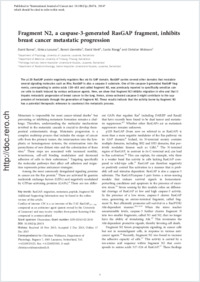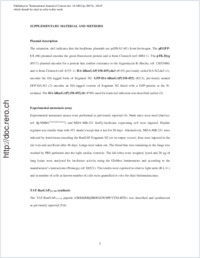Fragment N2, a caspase-3-generated RasGAP fragment, inhibits breast cancer metastatic progression
- Barras, David Department of Physiology, University of Lausanne, Switzerland
- Lorusso, Girieca Department of Medicine, University of Fribourg, Switzerland
- Lhermitte, Benoît Pathology Institute, Centre Hospitalier Universitaire Vaudois, Lausanne, Switzerland
- Viertl, David Department of Radiation Oncology, Centre Hospitalier Universitaire Vaudois, Lausanne, Switzerland
- Rüegg, Curzio Department of Medicine, University of Fribourg, Switzerland
- Widmann, Christian Department of Physiology, University of Lausanne, Switzerland
-
17.12.2013
Published in:
- International Journal of Cancer. - 2014, vol. 135, no. 1, p. 242-247
English
The p120 RasGAP protein negatively regulates Ras via its GAP domain. RasGAP carries several other domains that modulate several signaling molecules such as Rho. RasGAP is also a caspase-3 substrate. One of the caspase-3-generated RasGAP fragments, corresponding to amino acids 158–455 and called fragment N2, was previously reported to specifically sensitize cancer cells to death induced by various anticancer agents. Here, we show that fragment N2 inhibits migration in vitro and that it impairs metastatic progression of breast cancer to the lung. Hence, stress-activated caspase-3 might contribute to the suppression of metastasis through the generation of fragment N2. These results indicate that the activity borne by fragment N2 has a potential therapeutic relevance to counteract the metastatic process.
- Faculty
- Faculté des sciences et de médecine
- Department
- Médecine 3ème année
- Language
-
- English
- Classification
- Biological sciences
- License
-
License undefined
- Identifiers
-
- RERO DOC 209524
- DOI 10.1002/ijc.28674
- Persistent URL
- https://folia.unifr.ch/unifr/documents/303429
Other files
Statistics
Document views: 139
File downloads:
- pdf: 194
- Supplementary material: 132

